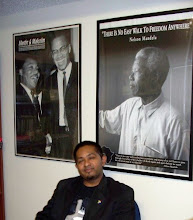
(Edited excerpt from Research on, “Contextual Black Liberation Theology”, by Seth Naicker)
In engaging the South African journey of change and a theology of liberation, I have come to appreciate the work of Steve Biko. Biko prophetically propelled liberation through mobilizing Black Consciousness. Black Consciousness sought to edify the lives of people in South Africa who were being marginalized and dehumanized by the Apartheid regime. Biko was at the forefront of a mental reform that was and is and will continue to be of vital importance, as he propelled a message that taught, encouraged and challenged people to love themselves.
My opening remarks about Biko might seem simplistic, but it is this apparent simplicity which is the foundation of an ideology for human development as well as the foundation of South African Contextual Black Liberation Theology. There are those who might disagree as Biko was critiqued for being a communist. It seems that the concern that liberation leaders have for social reform is stereotyped with social Marxism, but Biko was as man of faith who spoke with confidence the central liberation message of the gospel. Bonganjalo Goba affirms my observations by stating:
“At the wellspring of black political thinking, black consciousness continues to be a dominant force. What Steve Biko and other leaders succeeded in doing was to promote a new revolutionary consciousness by inculcating in the minds of our young blacks a sense of pride and a clear commitment to values that arise from our experience. This has had a tremendous influence in the way we do theology.”
Goba’s reference to a revolutionary consciousness became a matter of concern for the Apartheid government and Steve Biko was put on trial with other leaders.
The trial had to do with a specific matter of resistance in the planning of a rally to celebrate the recognition of Frelimo as the de facto government of Mozambique. However it became clear that the Black Consciousness Movement itself was on trial.
In this trail that lasted through most of 1975 and all of 1976, one of the questions that were posed to Biko concerned the work of Black Consciousness in conscientising people. Biko explains:
“We try to get blacks in conscientisation to grapple realistically with their problems, to attempt to find solutions to their problems, to develop what one might call an awareness, a physical awareness of their situation, to be able to analyze it and provide answers for themselves. The purpose behind it really being to provide some kind of hope; I think the central theme about black society is that it has got elements of a defeated society; people often look like they have given up the struggle.”
Biko further explains that through conscientising people, there is intention to fight against people giving up and seeks to build up their humanity. Biko understood the role of Apartheid played in stripping people of their dignity and their belief in their humanity. Biko encouraged people to be aware and analytical of their demised and oppressive social existence.
Biko was able to initiate a revolutionary consciousness that caused those he influenced to claim their human rights, counter the dominance and question the injustices they faced under Apartheid. In remembering Biko may we remember the movement of Black Consciousness which simply suggested to the marginalized of South Africa “love yourself”. May inspiration offered to people all around the world today, “Love yourself and while you are at it, love others too.”
Resources: Bonganjalo Goba, “Emerging Theological Perspectives in South Africa”, Irruption of Third World: Challange to Theology, Virginia Fabella and Sergio Torres Eds.,( NY: Orbis Books, 1983), 22.
C. R. Alred Stubbs, Ed., I Write What I Like: Steve Biko (Craighall, Johannesburg, South Africa: Picador Africa, 2004), 127.


No comments:
Post a Comment